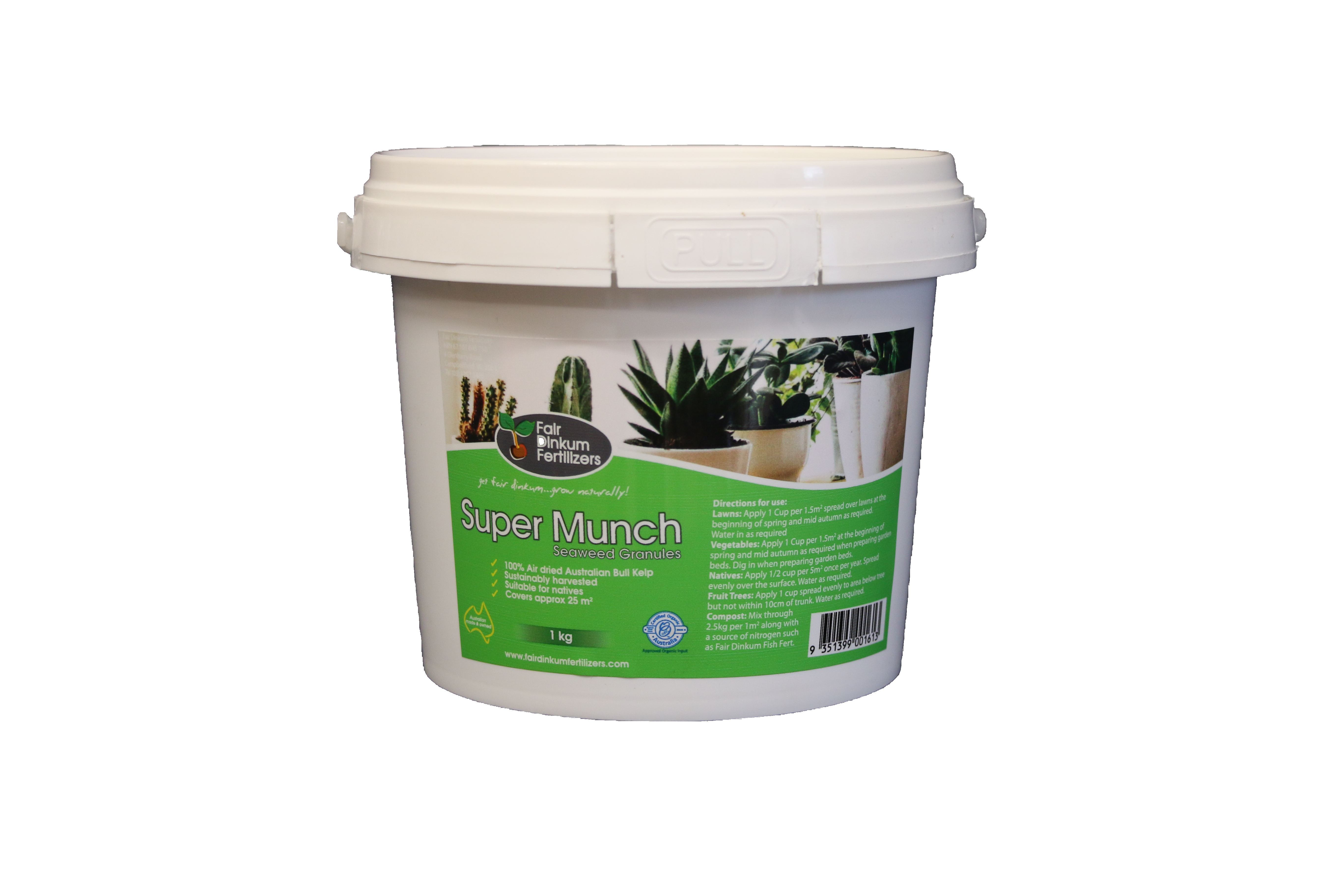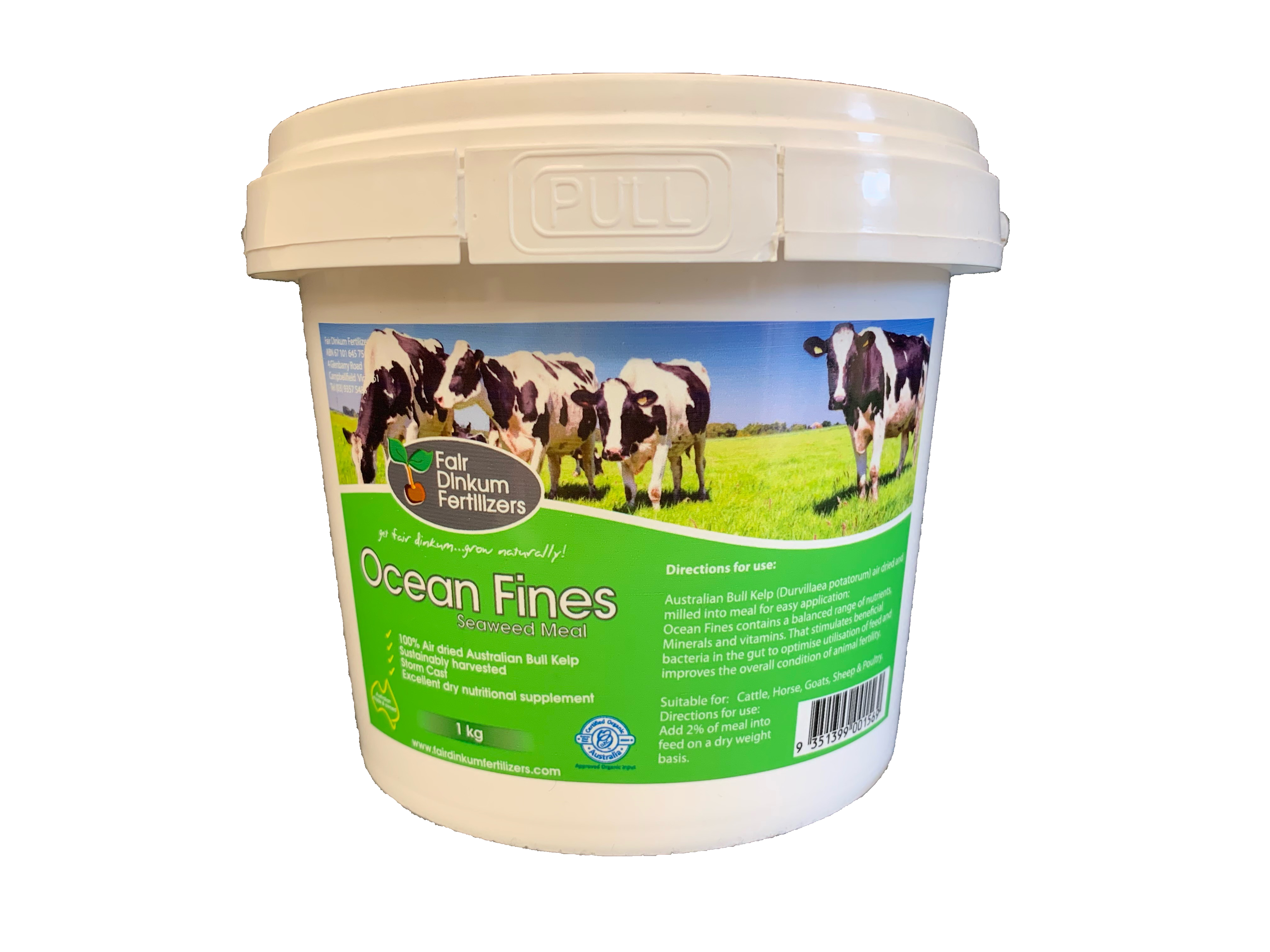

Super Munch Seaweed Granules & Ocean Fines Seaweed Meal – Natural, Powerful Boosts for Plants & Livestock
Looking for a natural way to boost your soil, plants, and livestock? Fair Dinkum Super Munch Seaweed Granules and Ocean Fines Seaweed Meal are packed with all the good stuff your plants and animals need to thrive.
Made from 100% Australian Bull Kelp, these products are all-natural, eco-friendly, and offer a range of benefits for both the garden and your animals.
For the Garden: Super Munch Seaweed Granules
Super Munch Seaweed Granules are designed to be applied directly to the soil. When you add them, the granules rehydrate and expand, releasing a powerful mix of nutrients and plant growth boosters.
The result? Healthier, more vibrant plants.
Promotes Root Growth: The kelp is rich in plant growth regulators like auxins and cytokinins, which support root development and help your plants grow stronger.
Boosts Nutrient Uptake: Granules break down naturally in the soil, helping plants absorb key minerals for healthy growth.
Supports Soil Microbes: The natural proteins and carbohydrates in the granules feed soil microbes, improving soil health and fertility.
Super Munch Granules are a natural, organic fertilizer that helps your plants grow bigger, stronger, and more resilient, without the need for harsh chemicals.
For Livestock: Ocean Fines Seaweed Meal
Ocean Fines Seaweed Meal is the same great seaweed, but milled into a fine powder for easy consumption by livestock. It's a powerful nutritional supplement for animals, especially for those needing an iodine boost, and is perfect for improving animal health.
Improves Animal Health: Packed with essential minerals like iodine, selenium, zinc, and magnesium, this seaweed meal helps boost the overall health of your livestock.
Boosts Fertility: Farmers have reported improvements in fertility and general health of their animals after using our seaweed meal.
Supports Digestion: Rich in natural compounds that help improve gut health and feed utilization.
Shiny Coats: It’s also great for improving coat smoothness and shine!
Our Australian Bull Kelp is harvested sustainably, free from harmful additives, and low in heavy metals, making it a safe, healthy addition to your livestock’s diet. It’s perfect for improving your animals' well-being naturally.
Why Choose Fair Dinkum Seaweed Products?
Sustainably Harvested: We use only Australian Bull Kelp, sustainably collected from the clean waters of Tasmania.
No Additives or Preservatives: Our products are all-natural and contain no chemicals or harmful substances.
All-Natural Fertilizer & Feed: Both Super Munch Granules and Ocean Fines Meal are organic and chemical-free.
How to Use:
For Plants (Super Munch Granules):
Sprinkle granules onto your soil and let nature do the rest. As the granules hydrate, they release essential nutrients and growth boosters that plants love.
For Livestock (Ocean Fines Seaweed Meal):
Feed about 5 grams per 100kg of body weight. You can mix it with molasses if your stock is reluctant at first, and for horses, use no more than 25-30 grams per day.
Ready to Boost Your Garden and Livestock Naturally?
Fair Dinkum Super Munch Seaweed Granules and Ocean Fines Seaweed Meal offer a simple, natural way to improve plant growth and animal health. No chemicals, just pure, organic power from the sea.
Shop now and give your plants and animals the boost they deserve with our all-natural seaweed products!
Analysis
Nitrogen 1.2%
Phosphorus 0.68%
Potassium 3.36%
Calcium 1.4%
Sulphur 1.2%
Magnesium 0.69%
Sodium 1.45%
Iron 260 ppm
Manganese 8.9 ppm
Zinc 29 ppm
Copper 8.5 ppm
Cobalt 0.14 ppm
Boron 130 ppm
Molybdenum 0.13 ppm
Alginic acids 28%
Lamiarin 1.6%
Mannitol 2.9%
Proteins 10 %
%W/V is grams per 100ml of product
ppm is parts per million on weight basis
g/l is grams per litre
mic = microns
Product Sizes Available
1 kg, 3 kg, 25 kg.
Product Brochure Super Munch Label Ocean Fines Label



